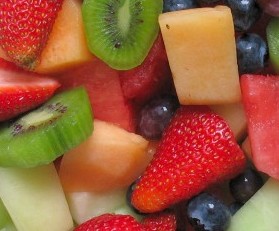Flashback to the dinner table as a child and hearing your parents tell you that “you should eat your fruit and veggies!” When asked why, the response was always the same, “they’re good for you.” Still wondering if your parents were correct all those years ago?
The answer is yes, it’s as important to eat fruit and vegetables today as it was years ago.
Health Benefits
According to the Academy of Nutrition and Dietetics, as well as the US Department of Agriculture, a diet high in fruit and vegetables can reduce your risk for heart disease, protect against certain cancers and help you to maintain a healthy weight; which in turn, can reduce your risk for developing other chronic diseases.
Several studies have shown a link between consumption of fruit and vegetables and chronic disease prevention. The Nurse’s Health Study and Health Professionals Follow Up Study both showed that men and women who consumed > 5 servings of fruit and vegetables per day were 30% less likely to have a heart attack or stroke.
The Dietary Approaches to Stop Hypertension (DASH) Study discovered that individuals with hypertension (high blood pressure) who consumed a diet high in fruit and vegetables, > 6 servings per day, combined with whole grains and low-fat dairy, were able to reduce their blood pressure by as much as 11 mmHg for systolic pressure and 6 mmHg for diastolic pressure.
Fruit and vegetables are also rich in antioxidants such as vitamin A and C. Vitamin A, found in dark green, red and orange fruits and vegetables, is helpful in keeping your skin, eyes and immune system healthy. Vitamin C, found in citrus fruits, sweet potatoes, bell peppers and kiwi, is important for wound repair and healthy teeth and gums.
So pile your plate high with fruit and vegetables! While all fruits and vegetables are beneficial, the most contribution comes from dark leafy green vegetables, broccoli, cauliflower, Brussels sprouts and citrus fruits such as lemons, limes and oranges.
Weight Maintenance Benefits
Fruit and vegetables are naturally low in fat and calories and are a great source of fiber. Choosing more fruits and vegetables usually means that you are choosing fewer high fat, high calorie options.
When trying to lose or maintain your weight, it is ideal to chose foods that are low in calories and high in nutrients; both fruit and vegetables fall into this category. Another benefit is that fruits and vegetables are good sources of fiber. Fiber helps keep you full and aids in digestive health.
Remember no single fruit or vegetable provides all of the nutrients you need, so variety is key. Use your local farmers markets to find all of the fresh, local and in season produce!
5 Ways to Eat Fruit and Vegetables Daily
- Top salads with fruits such as dried cranberries, pears, mandarin oranges, strawberries, or grapefruits.
- Grab and go! Have fruits and vegetables set out in easy to grab places
- Make a smoothie with low-fat yogurt, 1/2 cup berries, 1/2 banana, handful of spinach and blend.
- Add extra vegetables such as grated carrots, zucchini, bell peppers, spinach, or kale to pasta sauces and soups.
- Dig the dip! Pair a plate of raw vegetables with a low-fat dressing, hummus, salsa or guacamole dip. Fruit can be dipped as well, use low-fat yogurt, cinnamon and a touch of honey.

